
The Union for a Popular Movement was a liberal-conservative political party in France, largely inspired by the Gaullist tradition. During its existence, the UMP was one of the two major parties in French politics along with the Socialist Party (PS). In May 2015, the party was succeeded by The Republicans.

The Radical Party, officially the Republican, Radical and Radical-Socialist Party, is a liberal and social-liberal political party in France. Since 1971, to prevent confusion with the Radical Party of the Left (PRG), it has also been referred to as Parti radical valoisien, after its headquarters on the rue de Valois. The party's name has been variously abbreviated to PRRRS, Rad, PR and PRV. Founded in 1901, the PR is the oldest active political party in France.
This article gives an overview of liberalism in Belgium. Liberalism was a dominant force since the Belgian independence from the Netherlands. It is limited to liberal parties with substantial support, mainly proved by having had a representation in parliament. The sign ⇒ denotes another party in that scheme. For inclusion in this scheme it is not necessary that parties labeled themselves as a liberal party.

Liberalism and radicalism have played a role in the political history of France. The main line of conflict in France in the long nineteenth century was between monarchists and republicans. The Orléanists, who favoured constitutional monarchy and economic liberalism, were opposed to the Republican Radicals.
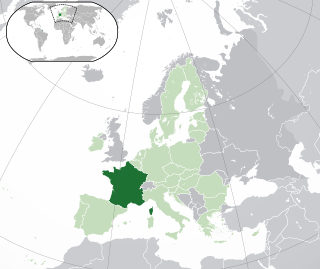
Lesbian, gay, bisexual, and transgender (LGBT) rights in France are some of the most progressive by world standards. Although same-sex sexual activity was a capital crime that often resulted in the death penalty during the Ancien Régime, all sodomy laws were repealed in 1791 during the French Revolution. However, a lesser-known indecent exposure law that often targeted LGBT people was introduced in 1960, before being repealed in 1980.
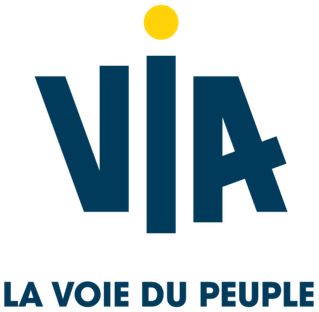
VIA, the Way of the People is a social conservative and Christian rightist party in France. The party was known as the Forum of Social Republicans (FRS) between 2001 and June 2009 before adopting the name Christian Democratic Party, which it used until 3 October 2020. The party was founded by Christine Boutin. On 3 October 2020, the party would change its name to the current one.
The Democratic Movement is a centre to centre-right political party in France, whose main ideological trends are liberalism and Christian democracy, and that is characterised by a strong pro-Europeanist stance. MoDem was established by François Bayrou to succeed the Union for French Democracy (UDF) and contest the 2007 legislative election, after his strong showing in the 2007 presidential election. Initially named the Democratic Party, the party was renamed "Democratic Movement", because there was already a small Democratic Party in France.
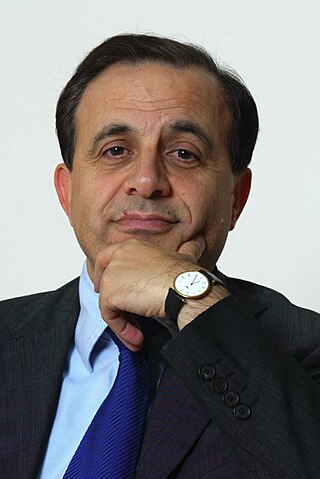
Roger Karoutchi is a French teacher and politician who has been serving as the first Vice President of the French Senate since 2020. He previously served as the French Ambassador to the OECD and as Secretary of State to the French Prime Minister, with responsibility for Relations with Parliament.

Franck Alix Georges Riester is a French politician who most recently served as Minister Delegate for Parliamentary Relations in the Government of Prime Minister Élisabeth Borne from 2022 to 2024. He previously served as Minister Delegate for Foreign Trade and Economic Attractiveness in the governments of Prime Ministers Jean Castex and Élisabeth Borne between 2020 and 2022. A former member of The Republicans, he founded and currently leads the centre-right Agir party.

Homosexualités et Socialisme is a politically independent LGBT organization affiliated with the Parti Socialiste in France officially, since 2015, and with the Parti Radical de Gauche since 2019. It was created in 1983 by Jan-Paul Pouliquen. From 1993 to 1997, its president was Stéphane Martinet. Its former president from 2007 to 2012 was Gilles Bon-Maury. It is a member of ILGA-Europe and was a member of Rainbow Rose.
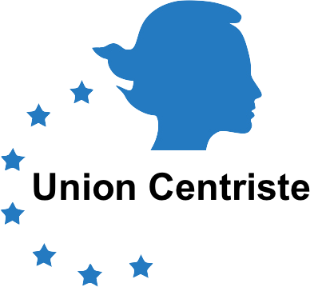
The Centrist Union is a centrist parliamentary group in the Senate uniting members of the Union of Democrats and Independents (UDI) and Democratic Movement (MoDem), as well as the Centrist Alliance (AC), a former component of the UDI. The group was historically associated with the Popular Republican Movement (MRP) and later the Democratic Centre (CD), Centre of Social Democrats (CDS), and Union for French Democracy (UDF). Most recently, from 2012 to 2017, it was known as the Union of Democrats and Independents – UC group.

The National Centre of Independents and Peasants is a right-wing agrarian political party in France, founded in 1951 by the merger of the National Centre of Independents (CNI), the heir of the French Republican conservative-liberal tradition, with the Peasant Party and the Republican Party of Liberty.
The Alliance (L'Alliance) or Republican, Ecologist and Social Alliance, often referred as "Confederation of the Centres", was a centrist, liberal, ecologist, and social-liberal coalition of political parties in France.

The Union of Democrats and Independents is a liberal political party in France and former electoral alliance founded on 18 September 2012 on the basis of the eponymous parliamentary group in the National Assembly.

LGBT+ Liberal Democrats is a British lesbian, gay, bisexual, transgender and other sexual minorities equality group of the Liberal Democrats political party. The organisation is one of several Specified Associated Organisations, giving it special status within the party, and has been referred to as one of the "most important" of such groups. The group campaigns both within the party and UK-wide on LGBT+ issues, as well as mentoring and providing advice to the party's candidates.
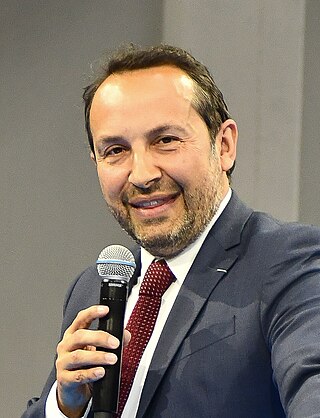
Sébastien Chenu is a French Rassemblement National (RN) politician serving as the member of the National Assembly for the 19th constituency of Nord since 2017. A former member of the Union for a Popular Movement (UMP), in 2017 he switched parties to sit under the leadership of Marine Le Pen. He served as vice-president of the French National Assembly from 2022 to 2024
The Radical Movement, officially the Radical, Social and Liberal Movement, was a liberal, radical and social-liberal political party in France.
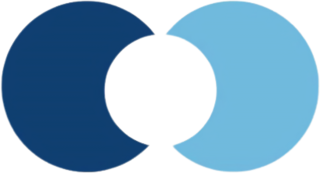
The Union of the Right and Centre is a term used in France to designate an electoral alliance between the parties of the right and of the centre-right.

Centrism in France has played a major role in French politics over many decades. This page presents the parties, political movements and personalities linked to Centrism in France according to their political traditions or their background. The different families of centrism are presented in the different sections.














